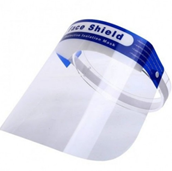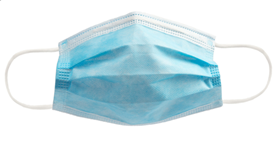Process Safety Engineer, Jake Bumpus & Health & Safety Consultant Aisling Hegarty have the lowdown!
As we approach into the second wave of the pandemic, many people are now experiencing what is called “COVID fatigue”. However, the need to maintain the protective measures – such as wearing face coverings – is more important than ever. In recent months, the wearing of face coverings has been made compulsory by the Irish government on all public transport, in shops, and in other indoor settings, to limit the spread of the virus. Many workplaces now require the wearing of face coverings, where reasonably practicable. There are many options of different types of face coverings such as disposable surgical masks, washable fabric masks, scarves and face shields. However, since the guidance on wearing face coverings came into effect, a question has been troubling many of us; which is most effective – face mask or face shield?
There have been conflicting reports on the efficacy of wearing a face shield/visor, with many medical experts saying they are not efficient in protecting us from the virus. Current HSE guidance states that visors “are not as good as wearing a face covering (masks), but you’ll still get some level of protection”. According to Dr Robert R. Redfield, Director of the US Centers for Disease Control and Prevention, “face coverings are one of the most powerful weapons we have to slow and stop the spread of the virus”.
The debate on wearing a face mask or face shield has also garnered the attention of many scientific professionals. A recent COVID-19 project was carried out at Mater Hospital Dublin by Professor of Surgery Ronan Cahill and Dr Kevin Nolan, on testing the effectiveness of different types of face coverings. The project involved the use of a high-speed camera to capture the movement of droplets from the nose and mouth, with and without wearing a face covering. A video of the results of the study can be viewed online here. The study demonstrated the wearing of face masks to be more effective in reducing the volume of cough and sneeze droplets dispersing in the air. Professor Cahill said that “an awful lot of the breath is diverted downwards unfiltered [when wearing a face visor] and that’s important for people to know”.
The choice to wear a face mask or face shield is often based on personal circumstances and a person’s occupation. The use of face masks have created issues for people who are deaf and hard of hearing in which communication is a challenge for people and this where we see a key benefit of wearing a clear visor to allow for lip reading. Face shields have proven advantageous for certain occupations like teaching where effective and clear communication with students is essential. Face shields are often more comfortable to wear for longer periods, often easier to wash and disinfect for re-use, and so could be more environmentally friendly than wearing disposable facemasks.
Face shields are used routinely by healthcare professionals to protect the eyes, nose and mouth from splashes of body fluids and respiratory droplets. However, they are often used in conjunction with other PPE such as face mask, safety glasses, and are worn primarily for the protection of the healthcare professionals, rather than as a form of transmission control.
Overall, it is widely accepted that the wearing of face coverings plays an important part in preventing the transmission of coronavirus. Current scientific research suggests that face coverings are more effective at providing this protection in comparison to face shields. However, face shields can still be a viable option, particularly in settings where social distancing can be maintained, and clear communication is important. It is important that all employers consider and implement the most appropriate protective measures for their own workplaces, as part of a robust COVID-19 risk assessment process.
You may also be interested in:
- COVID-19 Compliance Support, Inspection and Auditing Programmes Read More
- CMSE Consultancy, Top 3 COVID-19 FAQs Read More
- EHS Contract roles dominating the Job Market post COVID-19 Read More
Since the COVID-19 pandemic began, Chris Mee Group have continued to assist our clients to ensure that their workplaces remain as safe as possible for their staff and the public.
There is certainly some confusion around how best to practically implement the government guidance outlined in the ‘Return to Work Safely Protocol’.
Have a question? Chat to us instantly by clicking the chat box in the bottom right-hand corner of your screen. Alternatively, you can click here to email info@cmse.ie


